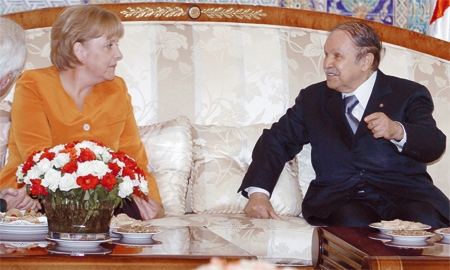
A relatively stable political situation has been contributing to a robust economic expansion over the past decade. Today, Algeria’s biggest challenges include tackling unemployment, addressing housing shortages, abating corruption, and developing the private sector further. Increased economic diversification and foreign partnerships also head the government’s priority shortlist.
Algeria is the largest country in Africa and the 10th largest in the world. More than 80 per cent of its territory is covered by the Sahara Desert. Consequently, over 90 per cent of its 37 million people live along the country’s fertile 620-mile Mediterranean coastline. The country is also one of the continent’s top five economies, fuelled by massive reserves of oil and natural gas which have given it a hefty cushion of $205.2 billion in foreign currency reserves, and a large hydrocarbon stabilisation fund.
Wary of over-reliance on filling its coffers from hydrocarbons, the government has been taking action to create a diversified and competitive economy, with the ultimate aim of becoming the biggest industrial base in North Africa. As such, Algeria’s business framework has evolved substantially in recent years. Overhauled legislation and new investment incentives are making their mark on the nation’s financial environment, adding weight the government’s affirmations that the formerly socialist Algeria no longer differentiates between public and private enterprises or national and foreign entities.
An official visit to Algeria in 2008 by Chancellor Angela Merkel prepared the ground for intensified economic relations with Germany across a raft of sectors. She stressed that the doors to business collaborations were open, affirming: “We should seize the opportunities.”
In May 2010, President Abdelaziz Bouteflika announced Algeria’s $286-billion investment plan for 2010-14, aimed not only at diversifying Algeria’s economy away from hydrocarbons revenue, but also improving infrastructure, increasing the overall skills base in the country, and supporting small and medium-sized enterprises (SMEs). During another visit later that year, Chancellor Merkel again highlighted the potential closer ties and for knowledge transfer and training programs, saying that Algeria's youth was “thirsty for knowledge” and offering German help in this regard.
Over the past five decades, Algeria has endured some turbulent times, including a civil war that dominated the 1990s. It has since become an oasis of relative peace and security in what is viewed as a fairly volatile region. The Arab Spring uprisings in large parts of North Africa and the Middle East that toppled autocratic regimes to the east of Algeria – in Tunisia, Egypt and Libya – did not ignite an ‘Algerian Spring’ last year, thanks in no small part to a populace reluctant to return to times of conflict, as well as swift action by President Bouteflika to address popular demands. For example, riots in January 2011 in reaction to escalating food prices subsided in less than two days after the government announced subsidies designed to reduce prices by 41 per cent for staples such as sugar and cooking oil.
Further measures followed in February last year, when President Bouteflika promised to rescind Algeria’s state-of-emergency legislation, which had been in place since 1992, and pledged to open up access to audio-visual media, an area that had been a state monopoly up to that point. Responding to widespread concern over unemployment in Algeria, the President also vowed to promote job creation, particularly for the country’s massive youth population, to further assuage discontent.
Reforms continued throughout 2011. In mid-April, President Bouteflika promised to amend the constitution and invited other political parties to submit proposals for changes to a parliamentary committee. Proposed reforms to the laws governing political parties, the electoral process, and nongovernmental organizations were announced in August. The following month, after the annual meeting between the government and the trade union confederation, a $40 increase in the monthly minimum wage to $240 was also announced.
Mr Bouteflika became President of Algeria in 1999, and was re-elected in 2004 for a second five-year presidential term. A change to Algeria’s constitution, which removed the previous limit of two presidential terms, enabled a third electoral victory in 2009 when he was reported to have won more than 90 per cent of the vote, carrying his leadership through to the next presidential elections scheduled for April 2014.
Peaceful parliamentary elections in May 2012 produced another win for the ruling National Liberation Front (Front de Liberation Nationale, FLN) party. Past elections have been marred by accusations of fraud, so at Algeria’s request these latest polls were held under international observation by the EU, the African Union and the Arab League. EU observers reported on how the elections were handled in "generally satisfactory" conditions, auguring well for the continued development of Algeria’s political system in the future.
Following the elections, new legislation and cooperation between Algerian authorities and UN Women regarding female representation in the country’s political sphere saw the proportion of women in the Algerian parliament increase from 7-31 per cent. President Bouteflika believes the relatively high turnout for May’s legislative polls, of around 43 per cent compared to 35 per cent in 2007, should mark the rise of a new generation.
Quelling the tide of Arab Spring revolt with ongoing progressive reforms and opening up the electoral process to international supervision have helped burnish Algeria’s reputation with Western allies who rely on the North African nation’s supplies of natural gas and contributions to tackling terrorism. The elections, which dashed Islamist opposition hopes of gaining power, garnered moderate praise internationally, with U.S. Secretary of State Hillary Clinton calling them a “welcome step”, and a statement from the EU referring to them as a “step forward in the reform process” that would consolidate democracy.
1 COMMENT
dont you think it's time for you to stop backing dictatorships and corrupted governments. Stop you double measures games! algerians need freedom of speech as much as you do. if you continue backing crappy governments, history will remember, history never forgets. stand by the people is a better choice.